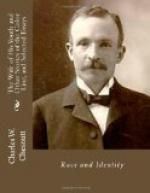“Ah, Misther Braboy,” she said one evening when they sat at the supper table alone,—it was the second girl’s afternoon off, and she had not come home to supper,—“it must be an awful lonesome life ye ’ve been afther l’adin’, as a single man, wid no one to cook fer ye, or look afther ye.”
“It are a kind er lonesome life, Mis’ Flannigan, an’ dat ‘s a fac’. But sence I had de privilege er eatin’ yo’ cookin’ an’ ‘joyin’ yo’ society, I ain’ felt a bit lonesome.”
“Yer flatthrin’ me, Misther Braboy. An’ even if ye mane it”——
“I means eve’y word of it, Mis’ Flannigan.”
“An’ even if ye mane it, Misther Braboy, the time is liable to come when things ‘ll be different; for service is uncertain, Misther Braboy. An’ then you ’ll wish you had some nice, clean woman, ’at knowed how to cook an’ wash an’ iron, ter look afther ye, an’ make yer life comfortable.”
Uncle Wellington sighed, and looked at her languishingly.
“It ‘u’d all be well ernuff, Mis’ Flannigan, ef I had n’ met you; but I don’ know whar I ‘s ter fin’ a colored lady w’at ’ll begin ter suit me after habbin’ libbed in de same house wid you.”
“Colored lady, indade! Why, Misther Braboy, ye don’t nade ter demane yerself by marryin’ a colored lady—not but they ’re as good as anybody else, so long as they behave themselves. There ’s many a white woman ‘u’d be glad ter git as fine a lookin’ man as ye are.”
“Now you ‘re flattrin’ me, Mis’ Flannigan,” said Wellington. But he felt a sudden and substantial increase in courage when she had spoken, and it was with astonishing ease that he found himself saying:——
“Dey ain’ but one lady, Mis’ Flannigan, dat could injuce me ter want ter change de lonesomeness er my singleness fer de ’sponsibilities er matermony, an’ I ’m feared she ’d say no ef I ’d ax her.”
“Ye ‘d better ax her, Misther Braboy, an’ not be wastin’ time a-wond’rin’. Do I know the lady?”
“You knows ’er better ‘n anybody else, Mis’ Flannigan. You is de only lady I ‘d be satisfied ter marry after knowin’ you. Ef you casts me off I ‘ll spen’ de rest er my days in lonesomeness an’ mis’ry.”
Mrs. Flannigan affected much surprise and embarrassment at this bold declaration.
“Oh, Misther Braboy,” she said, covering him with a coy glance, “an’ it ’s rale ‘shamed I am to hev b’en talkin’ ter ye ez I hev. It looks as though I ‘d b’en doin’ the coortin’. I did n’t drame that I ’d b’en able ter draw yer affections to mesilf.”
“I ‘s loved you ever sence I fell in yo’ lap on de street car de fus’ day I wuz in Groveland,” he said, as he moved his chair up closer to hers.
One evening in the following week they went out after supper to the residence of Rev. Caesar Williams, pastor of the colored Baptist church, and, after the usual preliminaries, were pronounced man and wife.




